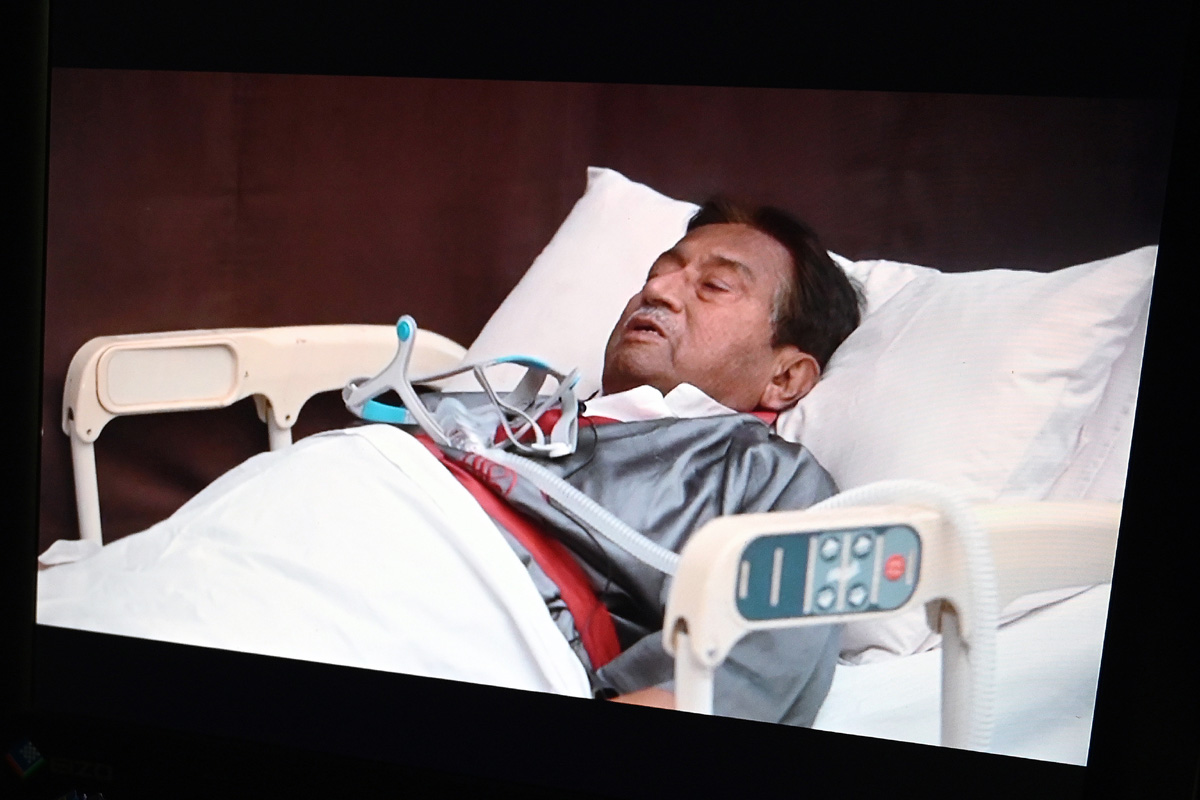Sana Mir and Usain Bolt named ambassadors of ICC T20 WC Qualifier 2024
Former Pakistan skipper Sana Mir and eight-time Olympic gold medallist Usain Bolt have been named as the ambassadors of women’s and men’s ICC T20 World Cup Qualifier 2024.
The machinations of General Ayub Khan, General Yahya Khan, and General Ziaul- Haq come readily to mind.

A video statement of the ailing exiled former Pakistani military ruler Pervez Musharraf in a hospital bed in Dubai is pictured on a screen in Islamabad on December 19, 2019. Exiled former Pakistan military leader Pervez Musharraf dismissed the unprecedented treason conviction and death sentenced handed to him earlier this week, saying the ruling was the result of a "personal vendetta". (Aamir QURESHI / AFP)
Lord Dunning’s famous truism is worth iteration ~ “Be you ever so high, the law is above you”. Pakistan’s former President and army chief, General Pervez Musharraf, has met his comeuppance with Tuesday’s death sentence awarded by Peshawar High Court for what it calls “high treason and subverting the country’s Constitution” when he imposed the Emergency in November 2007.
This is by any reckoning a severe nemesis for a para commando, verily a testament to the historically fragile democracy to the west of the Radcliffe Line. In terms of the power-play, the judiciary has reinforced its supremacy vis-a-vis the seemingly omnipotent Rawalpindi GHQ. A double whammy for the army that comes a fortnight after the Supreme Court curtailed the extension that was granted to the incumbent army chief, General Bajwa ~ by the Prime Minister ~ from three years to six months.
That apex court order was greeted with collective jaw-dropping both at the GHQ and the Prime Minister’s Office, a rather unusual conjunction of vested interests. Small wonder that in a strongly worded statement, the army said on Tuesday that the ruling had caused “pain and anguish” in the ranks, adding: “The due legal process seems to have been ignored.” In its reckoning, the case had been concluded in haste and that Musharraf “fought wars for the defence of the country [and] can surely never be a traitor”.
Advertisement
On closer reflection, Tuesday’s verdict has been the second setback for the military establishment at the hands of the judiciary and it may take a while for the army to shore up its image within the country. An intricate task awaits the next Chief. Defying multiple orders, Musharraf, 76, was not present in court to hear the verdict. Since 2016, he has remained in Dubai where he fights age and illness.
He was tried in absentia over charges relating to his suspension of the Constitution in 2007 as he attempted to hold on to power. The ruling is profoundly significant in Pakistan not the least because the military has always held overriding power in governance, even during civilian rule, and has a very close equation with Prime Minister Imran Khan. This is also the first time that a military leader has been sentenced for having subverted the Constitution. Not that the Constitution was never abrogated by the army.
The machinations of General Ayub Khan, General Yahya Khan, and General Ziaul- Haq come readily to mind. But all three had deftly managed to evade the courts. The landmark case was initiated in 2013 by Prime Minister Nawaz Sharif, who was ousted by Musharraf in a coup in 1999. It is a quirky coincidence that both have met their comeuppance in court, albeit for radically different reasons.
In the net, judicial history has been crafted in Pakistan, underlining the supremacy of the courts over the military establishment. This isn’t the time for piffle of the Imran Khan variety in the context of his threat of a nuclear war over citizenship in India. That would be an N-war too many, having made a similar threat over the change in the status of Kashmir.
Advertisement